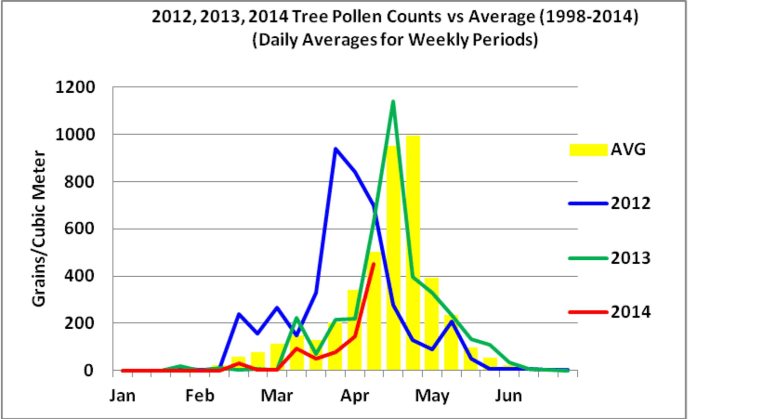If the constant cold weren’t enough, a brutal winter has many speculating that the polar vortex will be replaced by a “pollen vortex,” leaving allergy sufferers sniffling and miserable.
Alesia Kotek is ready for the worst. She and her 13-year-old daughter Caitlin share allergies to grass and trees — and Caitlin started getting itchy, watery eyes this spring while snow was still on the ground outside their Cleveland, Ohio, home. “I'm very nervous about this year with our allergies,” Alesia Kotek said.
The long, cold, winter felt by much of the U.S. may indeed have an effect on this year’s spring allergy season. But is this shaping up to be the worst allergy season on record?
That depends on what you mean by worst. Experts say that for much of the country, winter’s extended cold could lead to a shorter, but more intense allergy season.
And it was certainly a memorably freezing season for much of the U.S., with many states seeing record cold temperatures and heavy snow. And the bitter cold continued to linger. The National Weather Service reports that this was the 43rd coldest March on record.
Because warm, dry days are ideal for pollen release, allergy season is getting a late start.
“In the past we’ve seen maple pollen as early as late February,” says Dr. David Shulan, a fellow with the American Academy of Allergy, Asthma & Immunology, “but with this cold weather nothing was pollinating until mid to late April.”
Susan Kosisky, a microbiologist and chief of the United States Army Centralized Allergen Extract Laboratory, reports that daily average pollen counts from her laboratory in Silver Spring, Md., have been 50 percent or below what is normal for this time of year, which she attributes to cold temperatures.
But before you throw away the tissues, experts say the slow start could mean a more intense wallop. “It will be a shorter period by a number of weeks but you will see it all hitting very intensely,” says Dr. Shulan.
Dr. Rachel Szekely, an allergist at Cleveland Clinic, explains that a wet winter means healthy tree roots. And although we can’t predict exactly how plants will behave, experts say that the trees are simply waiting for warmer, drier days to release their pollen. While tree species usually stagger their pollen release throughout the season, the cold weather means that trees that normally release earlier will probably be releasing at the same time as trees that dispense pollen later in the season.
“It’s like winding up a spring and letting it go all at once,” said Shulan.

We can’t say for sure what will happen because pollen release is very much dependent on the weather. Pollen grains are small and very light, so they use wind to spread. “If it stays this cold and wet, we won’t see much pollen,” says Kosisky, "but if we can put together a string of warmer, sunny, dry days — we will probably see above-average pollen.”
A few warm days have given a glimpse into what this more intense allergy season could look like. A couple sunny, breezy days in New York City led to intense tree pollen release, according to Shulan. And when temperatures in Washington, D.C., reached 80 degrees on Sunday, “our pollen counts soared,” said Kosisky.
Soaring pollen counts are bad news for patients like the Kotek family, who enjoy being outside. Caitlin likes to swim, play basketball with her brother and ride her bike. Before getting allergy shots, Caitlin’s symptoms were so bad that she had allergy-induced asthma and was having serious breathing trouble.
So how can allergy sufferers prepare for potentially brutal pollen release? Besides keeping up with regular allergy medications, doctors recommend trying to avoid exposure. Keep your windows closed to keep out the pollen grains. If it’s hot, consider using air conditioning, which cuts down on pollen and mold by about 90 percent, said Shulan.
So while many are eagerly greeting an end to a seemingly endless winter, it will be a trade-off for patients with seasonal allergies. A spell of idyllic warm, dry weather might lead to “a potpourri of trees releasing above average amounts of pollen,” said Kosisky. So allergy sufferers should be prepared, she warns, because “there will be plenty of pollen for everyone.”
Kotek says that she and her family don’t let allergies stop them from their outdoorsy lifestyle — but she knows enough to be prepared. “We're never optimistic with our allergies,” she said.